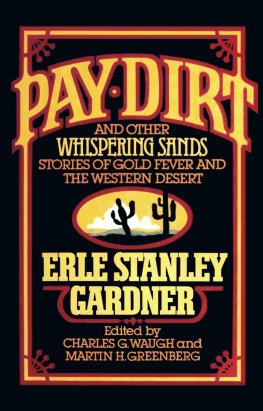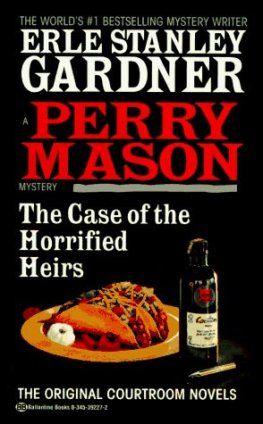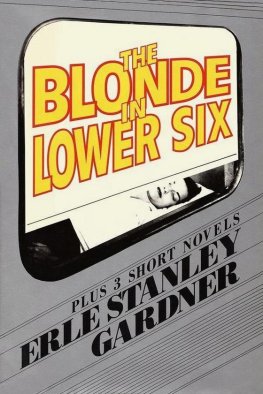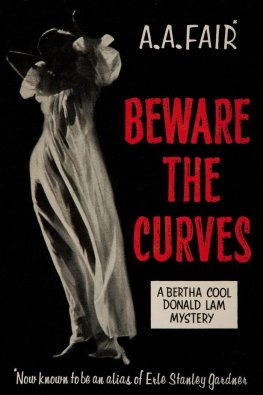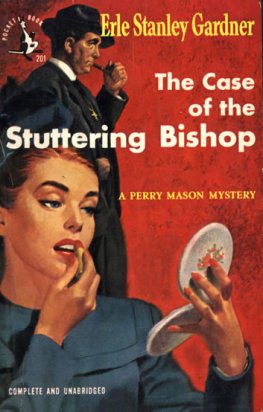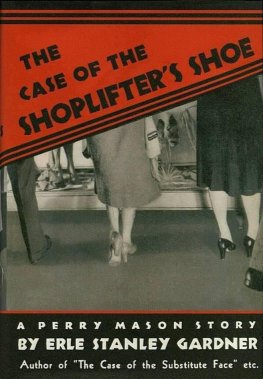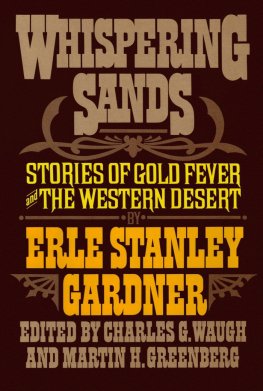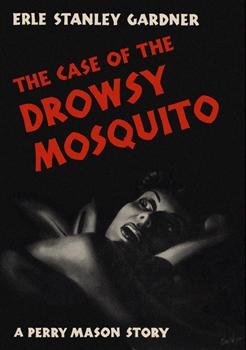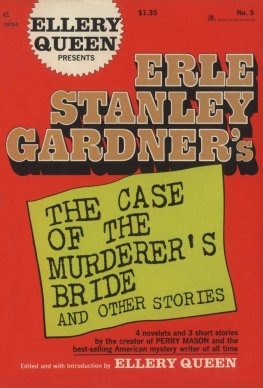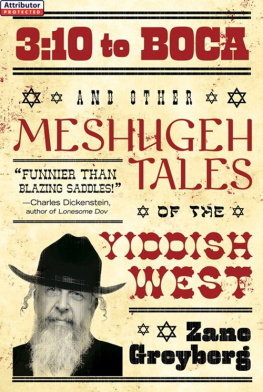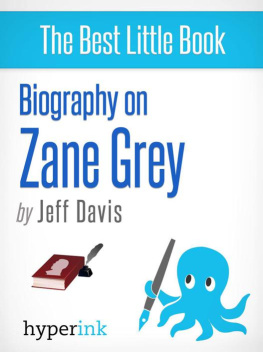Erle Stanley Gardner
Pay Dirt and Other Whispering Sands Stories of Gold Fever and the Western Desert
The stories in this collection were first published in Argosy magazine on the following dates:
Singing Sand, November 7, 1931
The Land of Painted Rocks, January 28, 1933
The Big Circle, September 2, 1933
Pay Dirt, April 25, 1931
The Land of Poison Springs, April 9, 1932
Stamp of the Desert, October 17,1931
Law of the Ghost Town, April 22, 1933
The Law of Drifting Sand, August 30, 1932
The Whip Hand, January 23, 1932
Erle Stanley Gardner (18891970) is one of the most popular writers of all time. His books have been translated into thirty-seven foreign languages. The first of his many mystery novels (The Case of the Velvet Claws, 1933) has sold four million copies. His paperback sales exceed every other author who has ever lived, and a current estimate of his total sales in all languages and editions would be well over 300 million copies.
Born in Massachusetts, Erle was ten when his family moved to Oregon, and the young boy grew into a hard-working and self-reliant amalgamation of East and West. Though he built a successful law practice, he was an outdoorsman by temperament and became a writer partly so that he could satisfy his taste for a semi-nomadic life-style. Indeed, his profound love for the southwestern deserts is reflected by the fact that he used them as the setting for more than seventy of his earliest works.
Twenty-one of these stories were known as the Whispering Tales series. Published in Argosy magazine from 1930 to 1934, they take place in what was then the contemporary West. Most involve gold, crime, and romance. All are told in the first person and seventeen feature Bob Zane, a middle-aged prospector who seems to function as a sort of alter ego for Mr. Gardner.
Nine of the stories were collected in the volume called Whispering Sands, published by Morrow in 1981, and nine more appear here for the first time since their initial publication fifty years ago.
The first, Singing Sand, finds Zane guiding a man he distrusts into Yaqui Indian territory to try to rescue a young woman held hostage. Preoccupied with the Yaquis, Zane is less reflective than usual and is, considering the treachery which takes place, lucky to escape alive.
In The Land of Painted Rocks, the dreams of a seemingly reincarnated Navajo Indian lead Zane and two friends to the Painted Desert, where they are ambushed and pursued by four gangsters intent on murder. But street smarts are no match for hard-won desert wisdom.
Later, in The Big Circle, Zane is pressed into driving to jail a suspect he believes innocent of murder. To turn the tables on the guilty, Zane plays the fool, risking his reputation.
Pay Dirt finds Zane functioning primarily as an observer to Old Petes attempts to make a man out of a spoiled kid. Initial skepticism ultimately gives way to surprise.
Gangsters chase Zane through The Land of Poison Springs, where a drink of tempting alkali water means painful death. Yet the desert is hot and some springs are pure.
In Stamp of the Desert, Zane must solve the mystery of why an accused thief refuses to defend himself. Fortunately, a good woman helps them both.
Perhaps encouraged by this success, Zane becomes the Law of the Ghost Town while on a brief sojourn from prospecting. But he resigns after finding justice more appealing.
Still mysteries continue to intrigue him. In The Law of Drifting Sand, he stumbles across one involving Death Valley, gold found in strange places, and murder.
Finally, The Whip Hand is a memorable story with a plot seemingly foreshadowing Gardners later Lam and Cool series. In it claim jumpers, a swindle, and a kidnapping all lead to a richly rewarding climax.
While Zane seldom describes himself physically, he makes frequent observations about life, civilization, and the desert. Indeed, they reveal quite a lot about his (and possibly his creators) personality, beliefs, and temperament when pieced together as we have done with the thirty-four snippets below.
The city dweller differs from the desert man. (Singing Sand, 19)
A professor of psychology camped with me for a while. He was out on the desert getting rid of a spot on his left lung. He told me that the subconscious mind was always receptive; that mans environment stamped itself indelibly upon his character, because of the innumerable little things that were soaked up by the subconscious mind, without the consciousness being aware of it.
I didnt get it in just the terms that he expressed it, but I got the idea all right, and I knew that it was the truth. (Sand Blast, 5253)
Every place a man lives leaves its stamp upon that man. (Singing Sand, 19)
Back in the cities a man getting along in the sixties or seventies or maybe eighties without even his next meal in sight and no chance of any sort of job, would get panicky, or maybe go to charity. Out on the desert its a matter of course. No one thinks anything about it.
For one thing old age aint much of a handicap out on the desert. They get old and dried up, but they always have their health and their strength. They can always get around and fight the desert. And the desert makes em fight just enough to make em remember theyre men. It keeps em fit. (Stone Frogs, 646647)
We desert men kid ourselves were looking for gold. It makes the game interesting. What were really doing is visiting with the desert. Its in our blood: open skies silence space freedom. (Sign of the Sun, 111)
Why work in the treadmill of civilization? Civilization taxes you almost a hundred percent for the privilege of participating in it.
You have butchers to make your kills, machinery to carry you from place to place, do your work. And yet one really lives in caves. Theyre made out of concrete instead of cut into the side of a precipice, but theyre caves just the same, steam-heated caves. Your liver gets sluggish, and you lose the capacity to enjoy life. (Gold Blindness, 135)
Out in the desert we get closer to fundamental truths than you do in the cities. (Priestess of the Sun, 289)
The desert knows the true philosophy of life. Man lives and suffers, and he learns through his suffering. (Singing Sand, 32)
Mile for mile the desert is the crudest country in the world, and therefore the kindest. Desert rabbits are the swiftest; desert rattlesnakes are the deadliest; desert coyotes the most cunning. Even the plants have to be coated with a natural varnish, studded with thorns.
Life progresses through overcoming obstacles, and the desert is the greatest natural obstacle. (Stamp of the Desert, 203)
Things seem sort of out of place to us when theyre cruel. Thats because were soft. But its cruelty that develops character. (The Law of Drifting Sand, 268)
Theres too much mercy in connection with man-made justice. After all, an immutable law that never varies is the one that gets the respect. (Blood-Red Gold, 202)
The desert doesnt save her weaklings. Its as remorseless as the ocean. A mistake, and the desert strikes. Those who have lived with her are the ones who have learned the ways of the desert. Thats her law. Learn her ways or die. (The Big Circle, 100)
But thats the desert. Its a wonderful mother, and a cruel one. And the cruelty teaches self-reliance, and self-reliance is pretty nearly the object of life, after all. (Blood-Red Gold, 202)
Ive seen men stand on the edge of the Grand Caon and say that it was a manifestation of the Eternal, a temple of nature and so forth. Its all of that. Its God, showing himself. But those same people turn away with a shudder when they see a cat torturing a mouse. If they only knew it, theres just as much of God manifesting himself in that as there is in the Grand Caon. (The Law of Drifting Sand, 268)

